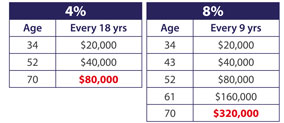
Understanding Compound Interest
One of the fundamental money concepts is Interest.
Interest, to give a very basic example, is often a “price” that is paid to borrow money. Compound interest is when interest is added to the starting amount, or principal, so that the interest that has been added also earns interest.
With compound interest, you earn interest on the money you save and on the interest that money earns. Over time, even a small amount saved can add up to big money. Whether you realize it or not, the concept of interest is a big part of your financial life because the possibility of earning interest is why people lend and borrow money.
What Does This Mean?
Your money can work for you when “your money earns money”. When your money goes to work, it may earn a steady paycheck. Someone pays you to use your money for a period of time. When you get your money back, you get it back plus “interest.” Your money can make an “income,” just like you. You can make more money when you and your money work.
Your Money Working For You
This example shows how compound interest can work in your favor by doubling your money after a certain number of years depending on the interest rate you are earning on your principal.
We can use the Rule of 72 to calculate the amount of time required.
72 / 4% = 18 Years To Double
72 / 8% = 9 Years To Double

All figures are for illustrative purposes only.
*This is a hypothetical scenario used for illustrative purposes and does not reflect the results of any specific investment. The actual time it will take an investment to double in value cannot be predicted with absolute certainty because performance of investments fluctuate over time.

Compound Interest Can Work Against You
Just like you can earn interest on money you have, banks and other financial institutions lend you money to earn interest.
Here is an example of how compound interest works against you.
